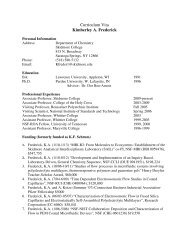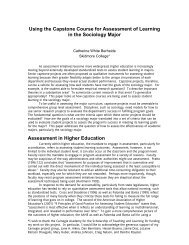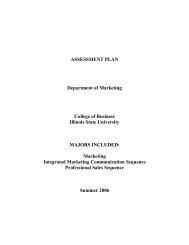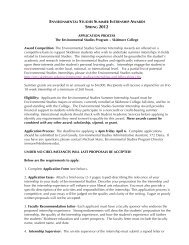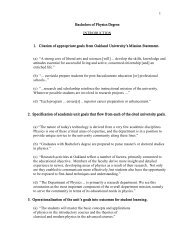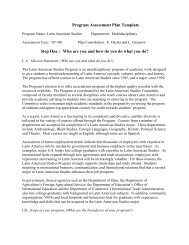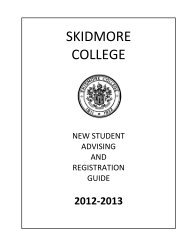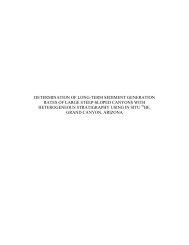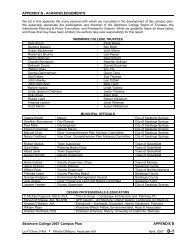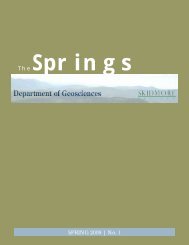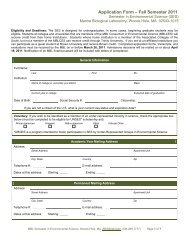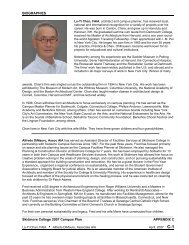ASSESSMENT PLAN FOR THE MATHEMATICS ... - Skidmore College
ASSESSMENT PLAN FOR THE MATHEMATICS ... - Skidmore College
ASSESSMENT PLAN FOR THE MATHEMATICS ... - Skidmore College
Create successful ePaper yourself
Turn your PDF publications into a flip-book with our unique Google optimized e-Paper software.
<strong>ASSESSMENT</strong> <strong>PLAN</strong> <strong>FOR</strong> <strong>THE</strong> MA<strong>THE</strong>MATICS MAJOR<br />
The Department of Mathematics offers degree programs leading to the<br />
BA and BS degrees in mathematics. A departmental committee was formed<br />
to devise a plan to provide ongoing assessment of the mathematics major.<br />
The committee solicited the input of the entire department, and the proposal<br />
was approved by the faculty.<br />
1. Goals of the Program<br />
Recipients of an undergraduate degree in mathematics are expected to<br />
understand and apply:<br />
• basic real analysis of one variable;<br />
• calculus of several variables and vector analysis;<br />
• basic linear algebra and theory of vector spaces;<br />
• concerted study of at least one advanced topic of mathematics, chosen<br />
from: advanced calculus, abstract algebra, set theory and logic,<br />
probability and statistics, partial differential equations, and numerical<br />
analysis.<br />
In addition, they are expected to acquire the ability and skills to:<br />
• give direct proofs, proofs by contradiction, and proofs by induction;<br />
• formulate definitions and give examples and counterexamples;<br />
• read mathematics without supervision;<br />
• follow and explain algorithms; and<br />
• apply mathematics to other fields.<br />
Degree Requirements. For the BA degree in mathematics, students must<br />
complete 21 credit hours in mathematics courses numbered above 300, including<br />
• Math 321 (an introduction to understanding and writing formal<br />
proofs),<br />
• 3 credit hours in a writing-intensive mathematics course,<br />
• 6 credit hours in a sustained two-course sequence approved by the<br />
department.<br />
For the BS degree in mathematics, students must complete 24 credit hours<br />
in mathematics courses numbered above 300, and 15 credit hours in additional<br />
upper division mathematics courses or appropriate non-introductory<br />
courses in the natural or information sciences, including<br />
• Math 321,<br />
• 6 credit hours in writing-intensive mathematics courses,<br />
• 6 credit hours in a sustained two-course sequence approved by the<br />
department.<br />
1
2 <strong>ASSESSMENT</strong> <strong>PLAN</strong> <strong>FOR</strong> <strong>THE</strong> MA<strong>THE</strong>MATICS MAJOR<br />
In addition, students in the BS program must demonstrate ability to program<br />
scientific problems on a computer by passing one of an approved list<br />
of courses.<br />
The Committee on the Undergraduate Program in Mathematics of the<br />
Mathematical Association of America established national guidelines for the<br />
mathematics major in its 1991 report [1]. The CUPM Report lists seven<br />
components which form the structure of the mathematical sciences major:<br />
A. Calculus (with differential equations),<br />
B. Linear algebra,<br />
C. Probability and statistics,<br />
D. Proof-based courses,<br />
E. An in-depth experience in mathematics,<br />
F. Applications and connections,<br />
G. Track courses, departmental requirements and electives.<br />
All of our mathematics majors take linear algebra Most mathematics majors<br />
at UH Manoa take probability and statistics; it has been suggested that<br />
this be added as a requirement for the major. Our requirements fit the<br />
national guidelines well. The degree requirements also correspond well to<br />
the departmental “Goals of the Program” given above.<br />
Other MAA guidelines for the mathematics major, taken from [3], include<br />
that the department should provide:<br />
• quality faculty advising,<br />
• undergraduate seminars,<br />
• special meeting rooms for majors,<br />
• undergraduate research opportunities.<br />
Math majors are encouraged to see their adviser at least once per semester<br />
(and are required to do so once per year). We have weekly undergraduate<br />
seminars and a lounge for math majors.<br />
2. Assessment Plans<br />
Assessment practices in mathematics departments at American colleges<br />
and universities are described in the MAA book Assessment Practices in<br />
Undergraduate Mathematics [2]. The departments described therein use a<br />
variety of techniques for assessing the major program:<br />
(1) capstone seminars,<br />
(2) senior projects or presentations,<br />
(3) standardized exams,<br />
(4) departmental exams for assessment,<br />
(5) comprehensive exams,<br />
(6) alumni questionnaires,<br />
(7) portfolios,<br />
(8) focus groups.
<strong>ASSESSMENT</strong> <strong>PLAN</strong> <strong>FOR</strong> <strong>THE</strong> MA<strong>THE</strong>MATICS MAJOR 3<br />
Most departments use more than one method. We use a capstone seminar,<br />
which includes a senior paper and presentation and a departmentally devised<br />
assessment exam, while continuing our use of alumni questionnaires. In<br />
addition, we keep track of what courses our graduating seniors actually<br />
took; i.e., we assess how they are actually meeting the major requirements.<br />
Capstone Seminar. The Mathematics Department has a one-credit capstone<br />
seminar, Math 480, required of senior mathematics majors.<br />
Each student in the seminar is required to write a short paper on a mathematical<br />
topic, and to present it to the seminar. This provides our majors<br />
with a research experience not available in most courses. It provides faculty<br />
representatives with an opportunity to evaluate the graduating seniors as a<br />
group. The faculty member responsible for the seminar provides a report<br />
to the department indicating the strengths and weaknesses of that group of<br />
students. This is part of the assessment.<br />
To receive credit, a student has to present an acceptable paper and take<br />
the assessment examination. The assessment exam does not affect the student’s<br />
grade for the course. It serves as one of the department’s objective<br />
assessment tools.<br />
The articles on Saint Mary’s <strong>College</strong>, Kutztown University and Wabash<br />
<strong>College</strong> in [2] provide detailed accounts of those institutions’ experience with<br />
capstone courses.<br />
Assessment Examination. The design of the examination is crucial to<br />
the effectiveness of the department’s evaluation. It is divided into three<br />
parts. The first part tests the student’s retention of basic calculus and linear<br />
algebra. The second part tests the student’s ability to produce and write<br />
elementary proofs and examples, that is, to think mathematically. The third<br />
part contains questions from each of the six specializations available in our<br />
program, and the student is asked to answer only questions relevant to the<br />
courses he or she has taken (and to indicate on the exam which these are).<br />
The exams are graded, summarized, and the summary results distributed<br />
to the faculty.<br />
The articles on Franklin <strong>College</strong>, Ball State University and Wabash <strong>College</strong><br />
in [2] provide detailed accounts of those institutions’ experience with a<br />
variety of assessment and comprehensive examinations.<br />
Alumni Questionnaires. The Mathematics Department sends questionnaires<br />
to all mathematics majors after graduation. The response rate has<br />
varied, but averages close to 50%. Most respondents write favorably of<br />
their experience as math majors at UHM. The results are summarized and<br />
reported regularly to the faculty.<br />
The model program in this area is that of the Department of Statistics<br />
at Iowa State University, described in detail in [2].
4 <strong>ASSESSMENT</strong> <strong>PLAN</strong> <strong>FOR</strong> <strong>THE</strong> MA<strong>THE</strong>MATICS MAJOR<br />
References<br />
[1] Committee on the Undergraduate Program in Mathematics, The Undergraduate Major<br />
in the Mathematical Sciences, Mathematical Association of America, 1991.<br />
[2] B. Gold, S. Keith, W. Marion, eds., Assessment Practices in Undergraduate Mathematics,<br />
Mathematical Association of America, 1999.<br />
[3] Task Force to Review the 1993 Guidelines, Guidelines for Programs and Departments<br />
in Undergraduate Mathematical Sciences, Revised edition, Mathematical Association<br />
of America, 2000.



